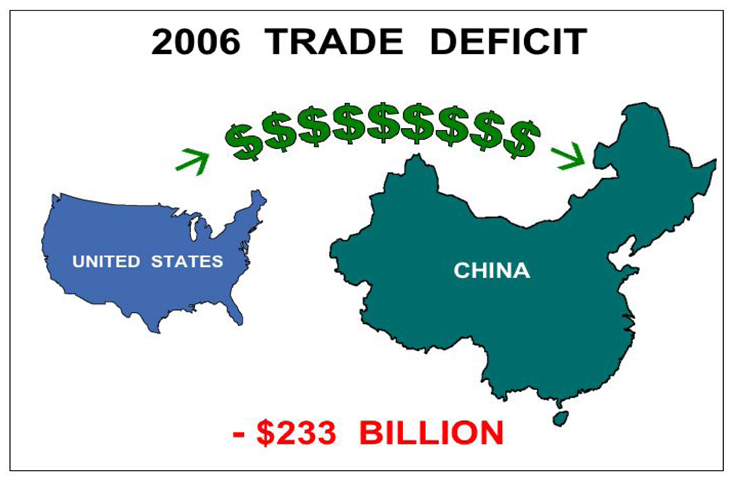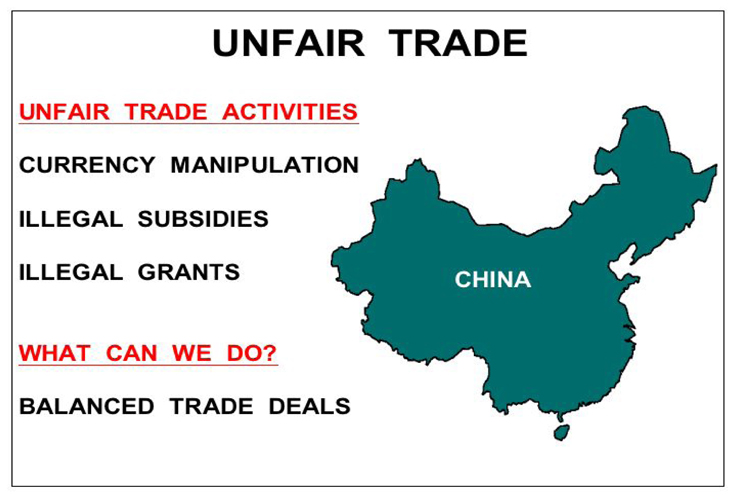Fair and Balanced Trade
Thank you very much, Congressman Michaud. I certainly appreciate being with you this evening, especially after an enlightening hour of finding out that really they weren’t borrowing and spending money.
But, indeed, this is the class of 2006. We were elected to take a positive change in a new direction. We are not the party of borrow and spend and borrow and spend. Because as you all know, the first two letters of borrow and spend are B and S. We are here this evening to talk with you about our trade policies. Indeed, our foreign trade with China has become entirely a negative number.
In this brief slide, the 2006 trade deficit will show you that the United States is losing. We have lost $233 billion a year in 2006. In the first 2001 numbers, $83 billion deficit has mushroomed to $233 billion.
In 2006, China ranked as the fourth largest export market for the United States and the second largest import market. They are our trading partner. We have had the American century, and now we are moving into what will become the Chinese century. But we should be ordered in the rule of law, and unfortunately for us here in the United States, we suffer because they are not following all of the laws.
In a recent article in The New York Times, it reads in part that the Chinese’s real advantage results from subsidies. They include government grants for modernization, low-cost loans, debt forgiveness, tax breaks for export or businesses and subsidies for suppliers of wood and pulp, something we are keenly aware of in Wisconsin, in my district, which used to be known as Paper Valley.
According to government data available from the Chinese government themselves, more than 70,000 illegal seizures occurred of private property, of land in 2004. In 2003, the Chinese admit that 168,000 occurrences of seizures took place.
Well, this is what happens in a Communist country, and it is to their advantage.
The subsidies: According to our own U.S. Trade Representative, “The Chinese subsidies at issue are widely available and offer significant benefits, particularly through income and value added tax breaks. They make it harder for U.S. products to compete with Chinese products, not only in the U.S. and Chinese markets but in any market in the world. They accomplish this by providing a competitive advantage to a wide range of Chinese exports, including, for example, various steel products, wood products, such as hardwood, plywood and paper products, and by providing incentives for Chinese firms to purchase domestic products instead of those from the United States.”
United States’ manufacturers and exporters are suffering because there is another trade partner of ours that is not following the rules. Indeed, 15 to 20 percent of all products made in China are counterfeit materials. They need to follow the rules.
On this slide is a measure of their unfair trade. There are three things primarily that China is not complying with: currency manipulation, their yuan is below where market prices would bear the price; illegal subsidies; and illegal grants, grants given to companies that have no intention of paying them back. And what can we do about this? We really need balance in our trade deals. We don’t need free trade; we need fair trade.
How do we fix an unfair trade deal? We need new leadership in the administration. We need a President and an administration that is interested in fair trade. And what must we do? We must establish fair trade and export our values, not our jobs. After all, if we don’t make anything in America, we simply won’t have anything.
SLIDE 1

SLIDE 2
